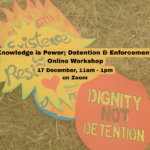
There are many harmful consequences of the lack of legal aid in the immigration and asylum system. One of them is translation. People seeking safety must provide certified English translations of key documents to support their case. A certified translation means the translator signs and dates the document to confirm it is a true and accurate translation of the original. This is required so the Home Office and courts can trust the translation, but it comes at a cost.
Why translation matters
Evidence is central in an asylum or immigration claim. Documents may be needed to prove identity, family ties, risk of persecution, or compliance with the Immigration Rules. The Home Office will not consider foreign-language documents unless they are translated. It is the applicant’s responsibility to provide supporting documents such as proof of identity, nationality, age, residence history, travel routes, medical evidence, and family background. Legal advice is crucial to identify what evidence matters and legal aid should cover certified translation costs.
The impact of the Legal Aid Crisis
But many people cannot get the legal advice they need. The latest research shows a deepening crisis: in England and Wales, asylum legal aid now meets only 43% of need (down from 83% in 2022). This leaves many regions as “advice deserts” with almost no access to quality support. In practice, this means 57% of people seeking safety have no lawyer. Without legal guidance, people do not know which documents matter, how to get them translated, or how to cover the cost.
Certified translations are expensive. In 2025, average costs are around £0.10–£0.16 per word, or £30–£45 per page (rising to £60 for legally sensitive or technical documents). For people forced to live on inhumanely low asylum support rates and without the right to work, this is out of reach.
What the Home Office has to say about costs of translations:
Recently, Care4Calais submitted a Freedom of Information (FOI) request to clarify whether the Home Office provides support for asylum seekers who cannot afford certified translation. In their response (13 August 2025), the Home Office confirmed:
- They do not provide financial support for translation costs.
- Applicants are advised to ask their legal representatives to arrange translations.
- Some charities (e.g. Refugee Action, Asylum Aid, British Red Cross) may offer informal translation support.
- If untranslated documents are submitted, applicants may be asked about their relevance at interview and given a short deadline afterwards to provide certified translations.
What this means in practice
The FOI response highlights yet another serious barrier to justice and the ongoing ripple effects of the legal aid crisis. For people seeking asylum, the cost of certified translations can mean vital evidence is never submitted, risking wrongful refusals and leaving people in danger. Once again, the burden is pushed onto voluntary and community organisations. These groups have already spent years plugging the holes of a deliberately broken system, and are now forced to cover translation costs or provide ad-hoc language support, stretching their already limited resources even further.
What next?
Read our recently updated Key Guide on Evidence for Asylum, Immigration and Human Rights Cases.
Read Dr Jo Wilding’s latest report No Access To Justice 2 (June 2025).
Learn more about and take part in the Access to Justice campaign organised by Migrants Organise here.
If you need a certified translation
If you do not have a lawyer and can pay for a certified translations then make sure that your translation has the following things to avoid being rejected by the Home Office and losing your money:
- Translator’s name and contact details
- Signature and date
- Statement confirming that it is a true and accurate translation
- Statement of the translator’s qualification
- Both the original document and the translation should be kept together
Be careful about which translation company that you use. Some warning signs of poor quality companies include:
- Only WhatsApp number/social media account – no actual website
- Very low prices (e.g. £5-£10 per page) – this usually means poor quality or no certification
- No experience with legal/immigration documents
- No reviews or bad reviews – make sure you check TrustPilot or Google reviews
- Request full payment upfront
If you cannot pay for a certified translation:
- If you have a lawyer, make sure you are communicating with them about what evidence you have and what certified translations are required.
- Prioritise which documents matter most. Focus on the documents that are directly relevant to your claim or application as not everything may need to be translated.
- Explain to the Home Office that you can’t provide a translation. Sometimes you might be able to use the original document, for example if you have an asylum interview you can take it with you. You should be asked what it is and why it matters and you may be given more time afterwards to submit a translation.
- Find a local organisation that may be able to help connect you with legal advice, help you find trusted translators or help with translation costs.
- Do not use online tools like Google Translate. They are often inaccurate and will not be accepted by the Home Office.
-Ally, Legal Education Officer
















Discussion: